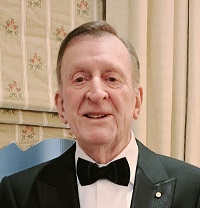Doug Daft AC
A lifelong career with one of the world's most distinctive brands gave Douglas Daft AC, an early University of New Engla nd graduate, a platform from which to foster global business relations and corporate social responsibility.
nd graduate, a platform from which to foster global business relations and corporate social responsibility.
In 2000, Mr Daft became the first non-American to take the helm of the iconic Coca-Cola Company, leading it until his retirement in 2004. However, it is for his work on behalf of what philosopher Adam Smith described as "the welfare of the whole society" that UNE this year awarded Mr Daft an Honorary Doctorate.
That work has had a wide canvas — he was co-chairman of the International Business Council of the World Economic Forum, and a corporate advisory board member of the Global Business Coalition on HIV/AIDS — and was also more focused. Mr Daft helped establish the Coca-Cola Australia Foundation, which promotes the development of young Australians through physical, artistic, cultural and other educational pursuits, and the Coca-Cola Mayoral Academic Awards, which helped undergraduates from Cessnock, NSW, where he grew up.
Mr Daft served on the inaugural UNE Advisory Group, and is a founding member of the Alumni Leadership Group of the Faculty of Commerce and Economics at UNSW. He was awarded a Companion in the Order of Australia (AC) in 2005 for service to leadership in the global business community, commitment to corporate social responsibility, contributions in the field of education, and support for community-based development initiatives.
Mr Daft started with the Coca-Cola Company just a year after graduating from UNE in 1968 with a Bachelor of Arts, majoring in Mathematics.
A resident of Robb College, he recalls a life of living, sleeping and studying within the UNE grounds in days when High Tea was still taken in the college dining room by students in mandatory green gowns. UNE showed the youth from Cessnock that "the world is full of differences — between people, thoughts, beliefs, prejudices — something that I had never really experienced coming from a small town and a close, safe family environment".
"I believe that UNE experience led me to want to see more, meet more people; and why, in 1970, when asked by Coca-Cola if I would like to go to Indonesia to live, I said yes without any hesitation — but of course after checking with my wife first!."
"That led to 'yes' to Hong Kong, Singapore, Japan and eventually the United States."
In the brief time between graduating from UNE and joining Coca-Cola's Sydney operations as a planning officer, Mr Daft was a teacher at Vaucluse High grappling with the mysterious business of learning from an unfamiliar perspective.
"I came to understand that learning is a process — a dialogue — and if you do it right you learn as much from your students as they do from you," he says
"Looking back, I believe that this understanding was crucial to successfully living and working in different countries. A huge error, one that is too easy to fall into, is to land in a new country, even a new town, take up a new role and believe that everything you have learnt up to that time is automatically applicable in the new environment."
"The error is in thinking that there is no need to learn and listen from those around you who understand the environment. I think this accounts for the failures, short and long term, of individuals in new roles or enterprises in new locations."
"Put another way, I believe that a genuine curiosity about the world, the desire to learn from others, is an essential ingredient for success after you complete University and in anything one undertakes in the future."
Mr Daft took up his first position in Coca-Cola's Sydney operations in 1969; the next year he and his wife moved to the company's offices in Indonesia. It was the first of several postings in East Asia that culminated in his appointment as Vice President of Coca-Cola Far East in 1982. He assumed responsibility for all Asia in 1991, and nine years later, for the whole company. He now lives in Florida.
Throughout his career, Mr Daft has held in mind principles he took from a youthful reading of 18th Century Scottish philosopher Adam Smith.
"First of all and obviously, I believed that to be successful in my role I had to build a successful enterprise — make a profit, satisfy my customers, meet the requirements of my 'boss', help to satisfy share owners, and so forth."
"But to ensure that one can sustain the enterprise's success, one has an obligation to what Smith called the “welfare of the whole society”.
"This obligation can be measured in many ways — like philanthropy, care for the environment, charitable work, provision of opportunities that would not normally be available to individuals. We have to develop our own ideas about our obligations depending on our situation."
"To my mind, failure to follow both the above principles will lead to a loss in confidence in one’s enterprise, and the value of business in general, and will lead to increasing cynicism, regulation and other impediments. If we reach this point, it makes it much more difficult to build a successful enterprise."
Mr Daft has pursued these ideas through a vast resume of positions outside his core work, including sitting on the boards of corporations including Wal-Mart; McGraw-Hill; Green Mountain Coffee; Sistema-Hals JSC; and Longreach Inc. He has also sat on the Board of Governors of Thunderbird — Garvin School of International Management in Arizona; been a Trustee of the Cambridge Foundation; a Visiting Fellow, Said Business School, Oxford University; and a Patron of the American Australian Association.
Reflecting on his career 52 years after his graduation, Mr Daft can report with conviction that UNE's current students should see their time at the University "not as the end of your education, but the beginning".

